From Waste to Recovery: Reducing Ocean Plastic Pollution in the Dominican Republic
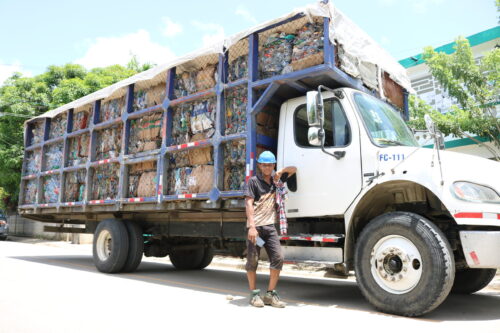
Cross-posted from USAID Medium
Alfonso Frías, now 32, has been collecting plastic waste since 2019 in Samaná Province, on the northeastern tip of the Dominican Republic. Known for its pristine waters and whale breeding ground, Samaná Province is also a rapidly developing tourist destination.
After many years in the hospitality sector, Alfonso saw first-hand the plastic generated by the island’s burgeoning tourism industry — and its fate to be landfilled or leaked into the sea.
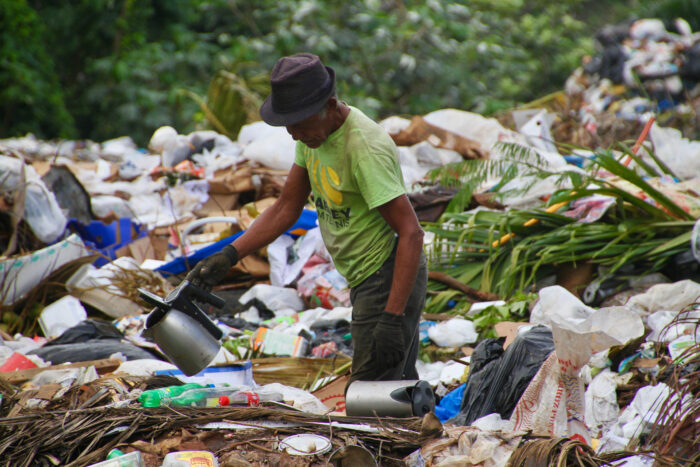
He started researching who was collecting the plastic waste. What he found were organizations buying the plastic to recycle in international markets, selling to companies like Adidas for new shoes and clothes. At the time, no plastic bottle recycling ventures existed in Samaná.
Driven by an entrepreneurial spirit and the potential to turn plastic waste into a resource, Alfonso decided to pioneer a new local industry: recycling.
The Dominican Republic generates over 11,000 metric tons of waste daily. Of that waste, more than 2,000 metric tons are plastic — the equivalent of eight million plastic water bottles every day. Over the last decade, up to 95 percent of that waste has been discarded in informal and open dumpsites that pose serious environmental and health concerns — particularly for the informal workers who sort and collect the waste.
After leaving the hospitality business, Alfonso started as one of many informal workers in Samaná — working to prevent waste from being dumped and enabling it to be reused and recycled in a circular economy. Waste offers livelihoods to so many — through recycling or other waste-related businesses — and informal workers are one of the greatest defenses against ocean plastic pollution.
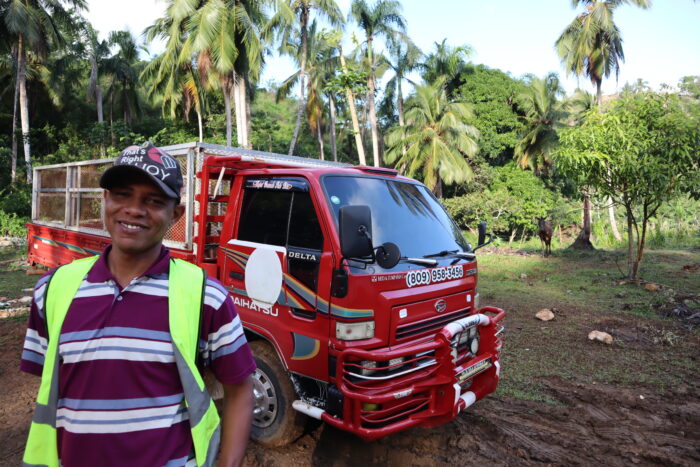
On his own, Alfonso set out to collect waste around town but had trouble creating a sustainable business because of the region’s weak recycling markets with no reliable buyer for the plastic he collected.
In July 2020, with the passage of the country’s first national law governing solid waste management, the tides began to turn in the country — with a new administration determined to address the country’s waste challenges, and individuals like Alfonso on the frontlines of this change.
Since November 2020, USAIDs Clean Cities, Blue Ocean — the Agency’s flagship program to address ocean plastic pollution under the Save Our Seas Initiative — has supported the Dominican Government to take a holistic approach to waste management in Samaná. This work includes building local, sustainable recycling systems, backed by informal waste collectors and entrepreneurs.
To increase plastic recovery and recycling rates, USAID and its partner, Sostenibilidad 3Rs, initiated community plastic bottle collection points where the community and a network of hotels now bring their plastic waste for recycling. That gives Alfonso a simplified way to collect discarded plastic.
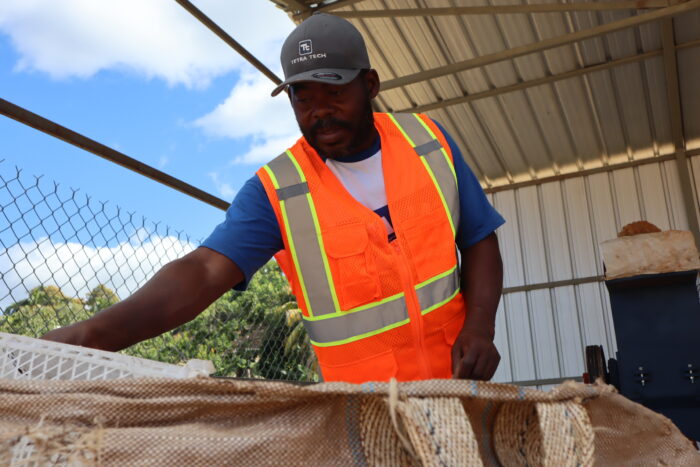
With USAID’s support, Alfonso registered his company, Reciclajes Bahía, and entered into an agreement with Cilpen Global, one of the country’s first and largest recycling facilities in Santo Domingo. He now sells plastics at a set, market rate. Through his business, for the first time, plastic waste from Las Terrenas is making its way back into the island’s circular economy.
USAID also helped Alfonso acquire a larger collection truck to accept new clients and increase his recycling hauls. Alfonso and his two employees collect on average almost four metric tons per month — the equivalent of 16,000 plastic bottles. He has plans to expand to more hotels and possibly even the airport in the future.
The country’s waste system is changing in other ways, too.
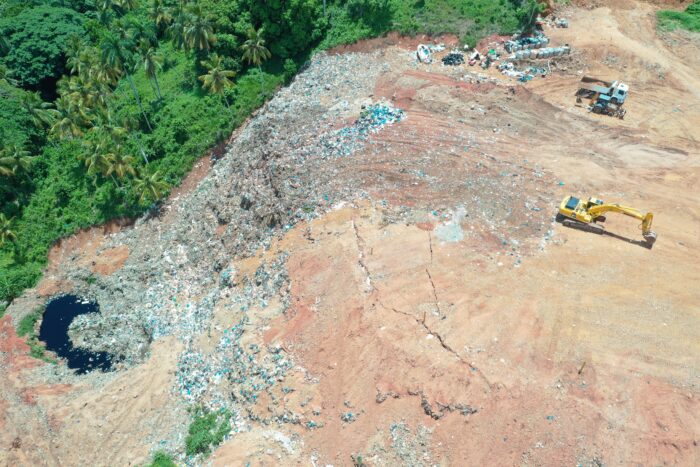
In Samaná, where Alfonso lives, there are four official dumpsites (and many informal dumping locations) situated precariously close to its delicate ecosystems and town centers.
Communities risk exposure to water contamination, toxic fumes, and noxious odors. Informal collectors work in especially perilous conditions, battling spontaneous fires and handling hazardous materials without the proper gear — just to collect the plastic or other materials to make a living wage. This has started to change.
With a large, presidential-led initiative to improve the management of waste, USAID partnered with the government and other partners to clean-up and eventually close two of the four dumpsites in Samaná.
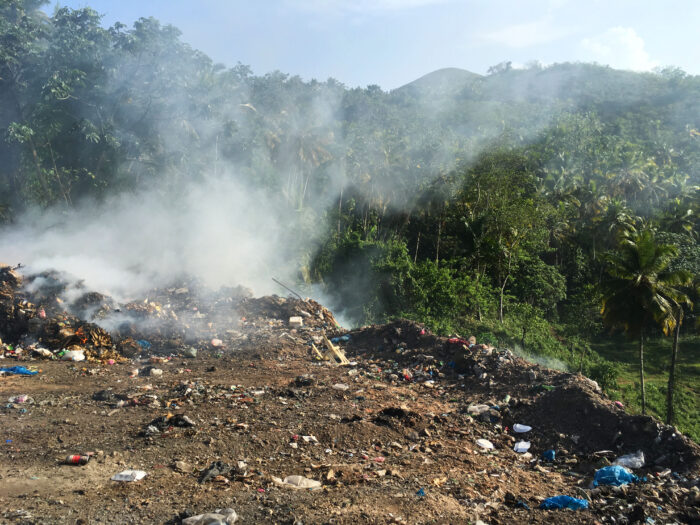
Once closed, these sites will serve as transfer stations where recyclable materials will be separated and cleaned before being sent to central recycling facilities — while the remaining waste will be sent to a new regional sanitary landfill that is in development.
USAID’s work has improved the health and environmental conditions for over 85,000 people — including the informal workers at the Samaná dumpsite by providing equipment and shaded areas for the workers to safely and more efficiently process recyclables.
This model is expected to be replicated across the country’s hundreds of open dumpsites and introduced nationally as a new approach to the way waste is managed.
When asked about his future, Alfonso says: “I see myself as a wave. I believe that in five years, more people will be recycling and I want to set that example for others.”
But he thinks much more action is needed to fully embrace the plastic recovery effort.
About the Author
Laurie Frydman is a Content Writer with USAID’s Clean Cities, Blue Ocean — the Agency’s flagship program to address ocean plastic pollution under the Save Our Seas Initiative.
Our Ocean Conference 2023
On March 2, USAID’s Clean Cities, Blue Ocean will host a side event at the Our Ocean Conference to highlight the critical role of local governments in managing waste and preventing that waste from entering our ocean. USAID’s Clean Cities, Blue Ocean — the Agency’s global, flagship program to address ocean plastics under the Save our Seas Initiative — works to combat pollution directly at its source in rapidly urbanizing countries around the world. By strengthening waste management systems and building circular economies, city by city, the program builds sustainable solutions that reduce ocean plastics while empowering vulnerable populations and mitigating pollution that affects human health and our climate.

